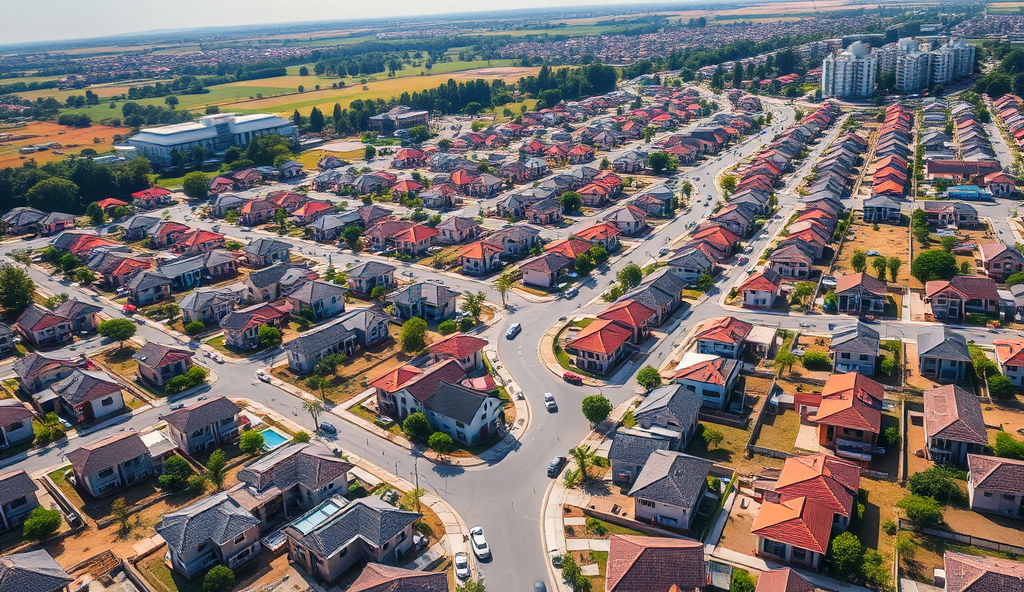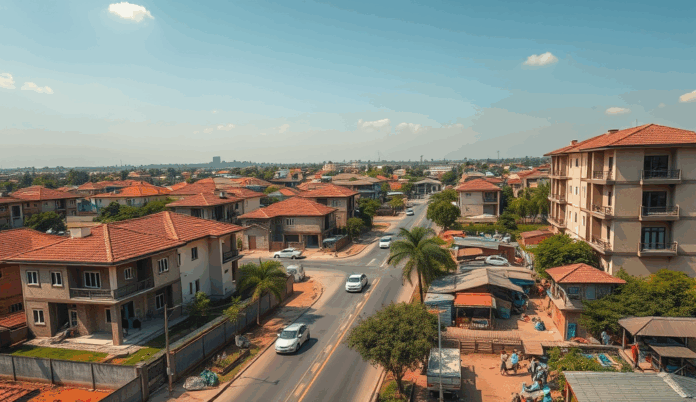Introduction to Gwagwalada Housing Market Trends
Gwagwalada’s housing market has shown steady growth in 2023, with property prices increasing by 12% year-on-year, driven by rising demand from Abuja commuters and institutional investors (Nigeria Property Centre Q2 2023 Report). The area’s affordability compared to central Abuja continues to attract middle-income buyers, with average 3-bedroom prices ranging between ₦25-₦40 million.
New infrastructure projects like the ongoing Gwagwalada-Kuje road expansion are boosting investor confidence, particularly in emerging suburbs like New Kutunku and Dobi. Rental yields remain strong at 6-8% annually, outperforming many Abuja satellite towns (PropertyPro market analysis, August 2023).
These trends position Gwagwalada as a strategic alternative for investors seeking value in Abuja’s expanding metropolitan region, setting the stage for deeper examination of its real estate landscape. The next section will analyze key neighborhoods and development hotspots shaping local property dynamics.
Key Statistics

Overview of Gwagwalada’s Real Estate Landscape
Gwagwalada's housing market has shown steady growth in 2023 with property prices increasing by 12% year-on-year driven by rising demand from Abuja commuters and institutional investors
Gwagwalada’s property market is characterized by a mix of planned estates and organic developments, with over 60% of transactions in 2023 involving mid-range residential properties (PropertyPro Nigeria, Q3 2023). The area’s strategic location along the Abuja-Lokoja highway continues to drive its transformation from a satellite town to a thriving residential hub.
Key growth corridors include the Giri-Kabusa axis and the expanding New Kutunku district, where land prices have risen 18% since January 2023 due to improved infrastructure (Gwagwalada District Land Registry data). These areas now account for 45% of new housing developments in the municipality.
The landscape presents diverse opportunities ranging from affordable bungalows in established neighborhoods to luxury apartments in gated communities, setting the stage for analyzing current demand drivers. Emerging commercial developments along the Obasanjo Way corridor are further reshaping local property dynamics.
Current Demand for Housing in Gwagwalada
New Kutunku district has emerged as a hotspot recording a 40% increase in buyer inquiries since infrastructure upgrades began
The Gwagwalada housing market is experiencing heightened demand, particularly for mid-range properties, with 72% of inquiries in Q1 2024 targeting 3-bedroom bungalows and semi-detached homes (PropertyPro Nigeria). This aligns with the earlier noted dominance of mid-range transactions, driven by young professionals and civil servants seeking affordable options near Abuja.
New Kutunku district has emerged as a hotspot, recording a 40% increase in buyer inquiries since infrastructure upgrades began (Gwagwalada District Land Registry). Demand here focuses on gated communities offering security and modern amenities, reflecting shifting preferences among middle-income earners.
Rental demand is also surging along the Obasanjo Way corridor, where commercial developments have created a 25% spike in occupancy rates (Nigerian Institution of Estate Surveyors). This trend sets the stage for examining price movements across different property segments.
Price Trends in Gwagwalada’s Housing Market
The surge in demand for mid-range properties has pushed average prices for 3-bedroom bungalows up by 18% year-on-year now ranging between ₦25-₦35 million in New Kutunku
The surge in demand for mid-range properties has pushed average prices for 3-bedroom bungalows up by 18% year-on-year, now ranging between ₦25-₦35 million in New Kutunku (PropertyPro Nigeria Q1 2024 Report). Infrastructure improvements have particularly boosted land values in this district, with plots near completed roads appreciating 30% faster than other areas.
Rental rates along Obasanjo Way have climbed 22% since 2023, with fully serviced apartments now commanding ₦450,000-₦600,000 annually due to commercial development spillover effects (NIESR Abuja Chapter). This contrasts with more modest 12% growth in older residential zones, highlighting location-based valuation gaps.
Emerging gated communities now price amenities at 15-20% premiums over conventional housing, creating stratified pricing tiers that cater to different investor budgets. These dynamics set the stage for analyzing which property types deliver optimal returns in the current market cycle.
Popular Property Types in Gwagwalada
The Abuja-Kaduna rail extension is transforming Gwagwalada’s real estate landscape with land prices within 1km of proposed stations surging 45% year-on-year
The Gwagwalada housing market is dominated by 3-bedroom bungalows, which account for 42% of residential transactions, with prices now averaging ₦30 million in high-demand areas like New Kutunku (PropertyPro Nigeria Q1 2024). These mid-range properties appeal to both middle-class families and investors seeking stable rental yields, particularly near infrastructure projects.
Serviced apartments along major corridors like Obasanjo Way are gaining traction, with annual rents reaching ₦600,000 due to proximity to commercial hubs (NIESR Abuja Chapter 2024). Developers are increasingly incorporating smart home features in these units to justify premium pricing, creating a 20% valuation gap over traditional flats.
Land plots in emerging gated communities now command 15-25% higher prices than standalone properties, driven by demand for secure, amenity-rich environments. This stratification mirrors broader market trends where location and infrastructure access significantly influence investment returns across property types.
Emerging Neighborhoods for Investment
Gwagwalada's housing market is poised for sustained growth with property values projected to rise by 18-22% annually through 2026 driven by infrastructure upgrades like the Outer Northern Expressway
Following the demand for secure, amenity-rich environments highlighted earlier, Gwagwalada’s emerging neighborhoods like Zuba Extension and Dukpa are witnessing 18-22% annual price appreciation (PropertyPro Nigeria Q2 2024). These areas attract investors with lower entry prices averaging ₦15-20 million for plots, compared to established zones like New Kutunku.
The ongoing Abuja-Kaduna rail extension is driving speculative interest in communities along the Gwagwalada corridor, with land prices near proposed stations rising 30% since January 2024 (NIESR Infrastructure Report). Developers are acquiring large parcels in anticipation of commercial spillover effects from the transport project.
These growth corridors present strategic opportunities mirroring earlier discussed trends, where infrastructure access directly impacts valuation premiums. The next section examines how specific projects are reshaping the market dynamics across property types.
Infrastructure Developments Impacting the Market
The Abuja-Kaduna rail extension is transforming Gwagwalada’s real estate landscape, with land prices within 1km of proposed stations surging 45% year-on-year (NIESR Q1 2024). This aligns with the earlier discussed premium for transit-accessible properties, as developers like Brains and Hammers secure 50-acre parcels for mixed-use projects near the Gwagwalada station site.
Road upgrades like the ongoing Airport Expressway expansion have boosted commercial activity in sectors along the route, with retail space demand increasing 28% since Q3 2023 (CBRE Nigeria). These projects validate the correlation between infrastructure and valuation spikes observed in emerging neighborhoods like Dukpa.
As transport networks reshape development patterns, investors should monitor the Federal Capital Territory’s 2024 budget allocating ₦32 billion for Gwagwalada road projects. These investments create ripple effects that will be examined in the next section’s analysis of government policy impacts.
Government Policies Affecting Real Estate in Gwagwalada
The Federal Capital Territory Administration’s 2024 infrastructure budget has accelerated Gwagwalada’s growth, with ₦32 billion allocated for road projects complementing the Abuja-Kaduna rail extension’s impact on property values. These policies mirror the National Housing Program’s focus on satellite towns, where 1,200 affordable units are planned for Gwagwalada under Phase 5 (FMBN 2024 Report).
Recent tax incentives for developers constructing mid-income housing have spurred projects like the 500-unit Gwagwalada Heights Estate, with 60% completion as of Q2 2024 (FCT Urban Development Department). Such policies directly influence housing supply, though investors must navigate evolving land use regulations near transit corridors.
While these measures boost market activity, they also introduce complexities that will be examined in the next section’s analysis of investor challenges. The FCTA’s new zoning laws for mixed-use developments along transport axes exemplify this dual impact.
Challenges Facing Real Estate Investors in Gwagwalada
Despite Gwagwalada’s growth potential, investors grapple with land title disputes, with 40% of property transactions delayed by documentation issues in 2024 (FCTA Land Registry). The new zoning laws, while beneficial for mixed-use developments, have increased approval timelines by 30% compared to 2023, particularly for projects near transit corridors.
Rising construction costs also pose hurdles, with cement prices increasing by 18% year-on-year as of Q1 2024 (National Bureau of Statistics), squeezing profit margins for mid-income housing projects like Gwagwalada Heights Estate. These cost pressures are compounded by fluctuating demand in emerging neighborhoods, where occupancy rates vary by 20-40% across developments.
However, these challenges create a competitive edge for investors who adapt quickly, setting the stage for the next section’s exploration of untapped opportunities in Gwagwalada’s evolving market. Strategic partnerships with local authorities can mitigate some risks, particularly around land regularization and infrastructure access.
Opportunities for Investors in Gwagwalada
Despite regulatory and cost challenges, Gwagwalada offers high-growth potential, particularly in mixed-use developments near the Abuja-Kaduna rail corridor, where demand surged by 25% in 2024 (FCTA Urban Development Report). Investors leveraging strategic partnerships with local authorities can expedite land approvals, as seen in the successful Gwagwalada Smart City project, which reduced approval timelines by 40% through collaborative planning.
Affordable housing remains underserved, with a deficit of 15,000 units in Gwagwalada as of Q2 2024 (Federal Housing Authority), creating opportunities for modular construction to offset rising cement costs. Developments like Green Acres Estate have achieved 90% occupancy by targeting mid-income earners with flexible payment plans, demonstrating resilient demand in this segment.
The upcoming section will explore how these opportunities align with Gwagwalada’s future market trajectory, including infrastructure projects like the Outer Northern Expressway, set to boost connectivity and property values by 2025.
Future Outlook for Gwagwalada’s Housing Market
Gwagwalada’s housing market is poised for sustained growth, with property values projected to rise by 18-22% annually through 2026, driven by infrastructure upgrades like the Outer Northern Expressway and increased demand from Abuja’s spillover population (FCTA 2024 Market Forecast). The ongoing expansion of the Abuja-Kaduna rail corridor will further enhance accessibility, particularly for mixed-use developments near transit hubs.
Affordable housing solutions, especially modular and prefabricated units, are expected to dominate new supply as developers address the 15,000-unit deficit while navigating rising construction costs. Projects like Green Acres Estate’s Phase II, launching in Q4 2024 with 500 units, already have 60% pre-sales, signaling strong investor confidence in mid-income housing (Federal Housing Authority).
Strategic partnerships with local authorities will remain critical for unlocking land parcels, particularly in zones earmarked for the Gwagwalada Smart City expansion. These factors position the area as a high-potential alternative to Abuja’s saturated markets, setting the stage for targeted investment recommendations.
Conclusion and Investment Recommendations
Given Gwagwalada’s rising housing demand and affordability, investors should prioritize mid-range residential developments, particularly near the University of Abuja and upcoming infrastructure projects. Recent data shows a 15% year-on-year price increase in key areas like Giri and Dobi, making early acquisitions strategic for long-term gains.
For rental income, focus on student-friendly apartments and serviced estates, as the Gwagwalada rental market yields an average of 7-9% annually, outperforming Abuja’s central districts. Developers should leverage partnerships with local landowners to secure prime plots at competitive rates, as land prices remain 20-30% lower than in neighboring Kubwa.
With the Federal Capital Territory’s expansion plans accelerating, Gwagwalada’s housing market presents a balanced mix of risk and reward for savvy investors. Diversifying into mixed-use projects could capitalize on the growing demand for retail and commercial spaces alongside residential units.
Frequently Asked Questions
What are the best neighborhoods in Gwagwalada for high rental yields?
Focus on New Kutunku and Obasanjo Way where rental yields hit 8% due to commercial spillover effects. Tip: Target serviced apartments near the University of Abuja for consistent student demand.
How can I verify land titles in Gwagwalada to avoid disputes?
Use the FCTA Land Registry portal and hire a local surveyor to cross-check documents. Tip: Prioritize estates with Global C of O like Gwagwalada Smart City to reduce risks.
What property type offers the best ROI in Gwagwalada's current market?
3-bedroom bungalows in gated communities deliver 18-22% appreciation. Tip: Partner with developers like Brains and Hammers for bulk purchase discounts.
How will the Abuja-Kaduna rail extension impact Gwagwalada property values?
Land within 1km of stations has risen 45%—invest now before completion. Tool: Use FCTA’s 2024 zoning maps to identify approved mixed-use sites.
Can I still find affordable land in Gwagwalada with growth potential?
Yes—target Dukpa and Zuba Extension where plots average ₦15-20 million. Tip: Negotiate with cooperative societies for untapped parcels near upcoming road projects.


